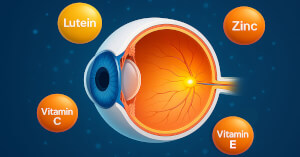
Recommended Vitamins and supplements for Dry Eyes

Dry, itchy, or irritated eyes are more than just a small annoyance. For many people, dry eyes can affect work, focus, and overall comfort throughout the day. While eye drops and artificial tears can provide short-term relief, they don’t always address the root cause. This is where nutrition and supplements come in — certain vitamins and nutrients can support your eyes from the inside out and help improve natural tear production.
In this article, we’ll go through the most important vitamins and supplements for dry eyes, how they work, and how you can include them safely in your routine.
Understanding Dry Eyes
Dry eye syndrome occurs when your eyes do not produce enough tears or when the tears evaporate too quickly. A healthy tear film is made of water, oils, and mucus. If any of these components are out of balance, your eyes can feel dry, gritty, or irritated.
Common triggers include long hours in front of screens, aging, hormonal changes during menopause, certain medications like antihistamines, or environmental factors such as dry air. While lifestyle plays a big role, nutrients can also influence how well your eyes stay hydrated.
Key Vitamins and Nutrients for Dry Eyes
Omega-3 Fatty Acids (Fish Oil or Algal Oil)
Omega-3 fatty acids are one of the most researched nutrients for dry eyes. Found in fish oil or plant-based algal oil, they have powerful anti-inflammatory effects. Inflammation is one of the reasons why the oily layer of your tear film breaks down too quickly, leading to faster evaporation.
By improving tear quality and reducing inflammation, omega-3s may make your eyes feel more comfortable and hydrated. Several studies show that people who take fish oil supplements report less dryness and irritation compared to those who don’t.
✔️ Typical Dosage Range: 1,000 to 2,000 mg of combined EPA and DHA daily.
Vitamin A
Vitamin A is crucial for eye health and tear production. Without enough of it, the surface of your eye (the cornea) can become dry, irritated, and even damaged. Severe vitamin A deficiency is rare in developed countries, but even mild deficiencies may contribute to dryness and poor eye comfort.
You can get vitamin A from foods like carrots, sweet potatoes, and leafy greens, but in some cases, a supplement may help fill the gap.
✔️ Typical Dosage Range: 2,500 to 5,000 IU daily from diet or supplements. Avoid high doses long-term unless recommended by a doctor.
Vitamin D
Low vitamin D levels have been linked to higher rates of dry eye syndrome. This vitamin plays a role in reducing inflammation and supporting tear stability. People with vitamin D deficiency often report eye discomfort, and studies suggest supplementation may ease dryness.
Since many people do not get enough vitamin D from sunlight alone, especially in winter months, a daily supplement can be useful.
✔️ Typical Dosage Range: 1,000 to 2,000 IU daily, adjusted based on your blood test results.
Vitamin E
Vitamin E is a powerful antioxidant that protects your eyes from oxidative stress. When free radicals damage cells in the eyes, dryness and irritation can get worse. Taking vitamin E alongside omega-3 fatty acids may enhance results, as the two work together to reduce inflammation and protect eye tissues.
✔️ Typical Dosage Range: 100 to 400 IU daily.
Vitamin B12
Vitamin B12 is a water-soluble vitamin that plays a key role in nerve health and cell repair. Research shows that a deficiency in B12 can be linked to dry eye disease and even eye pain. In fact, a 2020 study involving 76 people found that combining oral vitamin B12 supplements with artificial tears significantly improved dry eye symptoms.
Scientists believe vitamin B12 may help repair the corneal nerve layer — the nerves on the surface of your eye — which could explain why it reduces burning and irritation often felt with dry eyes. Since absorption of B12 varies depending on your digestive health, some people benefit more from supplements than others.
✔️ Typical Dosage Range: 2.4 mcg daily is considered safe for adults, though higher doses are often used in supplements. Because vitamin B12 has no established upper limit, talk with your doctor about the right dosage for you.
Lutein and Zeaxanthin
Lutein and Zeaxanthin are carotenoids found in colorful vegetables like kale, spinach, and peppers. These antioxidants accumulate in the retina and filter harmful blue light from screens and sunlight. While they are best known for protecting against macular degeneration, they also help keep the eye surface hydrated and reduce eye strain, which can make dry eye symptoms worse.
✔️ Typical Dosage Range: 10 to 20 mg lutein and 2 to 4 mg zeaxanthin daily.
Other Helpful Nutrients
Besides the main vitamins, a few other nutrients may also support tear production and reduce irritation:
- Zinc – helps the body use vitamin A effectively and supports tissue repair.
- Gamma-linolenic acid (GLA) – an omega-6 fatty acid found in evening primrose oil and borage oil. Some studies suggest it improves tear quality.
- Probiotics – early research suggests that gut health may influence inflammation and tear film stability.
Lifestyle Tips for Dry Eyes
Supplements are only part of the solution. Small daily habits can also make a big difference in reducing dry eye symptoms:
- Follow the 20-20-20 rule when using screens: every 20 minutes, look at something 20 feet away for 20 seconds.
- Use a humidifier in dry environments to keep the air moist.
- Stay hydrated by drinking enough water throughout the day.
- Avoid smoking and limit exposure to air-conditioning or heating vents blowing directly on your face.
When to See a Doctor
If your eyes remain persistently dry despite supplements and lifestyle changes, it’s time to consult an eye specialist. Professional treatments such as medicated eye drops, punctal plugs, or light therapy may be necessary. Also, if you experience severe redness, pain, or changes in vision, do not ignore these symptoms — they can signal more serious eye problems.
Conclusion
Dry eyes are frustrating, but the right mix of nutrition, supplements, and habits can make a real difference. Omega-3s, vitamins A, D, and E, plus antioxidants like lutein and zeaxanthin, are some of the best options for easing eye dryness naturally. Combined with good hydration, screen breaks, and regular eye check-ups, these nutrients can help your eyes stay comfortable and healthy every day.
Frequently Asked Questions
What are the best vitamins and supplements for dry eyes?
Top options include omega-3s, vitamin A, vitamin D, vitamin E, vitamin B12, and carotenoids like lutein and zeaxanthin. GLA from evening primrose oil and zinc can also help.
Do omega-3 supplements help with dry eyes?
Yes, omega-3s support the oily layer of the tear film and reduce inflammation. Many people report less burning and irritation after consistent use.
Can vitamin B12 help with dry eye symptoms?
Low B12 is linked to dry eye and eye discomfort. Supplementing B12 may support corneal nerve health and reduce burning sensations, especially if you are deficient.
How long does it take for supplements to improve dry eyes?
Most people need 4 to 8 weeks of consistent use to notice meaningful changes. Omega-3s and vitamin D often need several weeks to build up.
Can supplements replace eye drops?
No. Supplements support the tear film from within, while drops give direct relief. Many people use both for the best results.
Is vitamin A safe for dry eyes?
Moderate doses are generally safe, but avoid high doses without medical advice. Vitamin A is essential for corneal health and tear production.
Fish oil or algal oil for dry eyes?
Both provide EPA and DHA. Fish oil is widely used. Algal oil is a good vegetarian option with similar benefits when dosed to match EPA and DHA.
Do lutein and zeaxanthin help screen-related dryness?
They filter blue light and support retinal health. While known for macular support, they may reduce strain that can worsen dry eye symptoms.
This article was originally published on Stackbb, your trusted source for science-based supplement guides.





